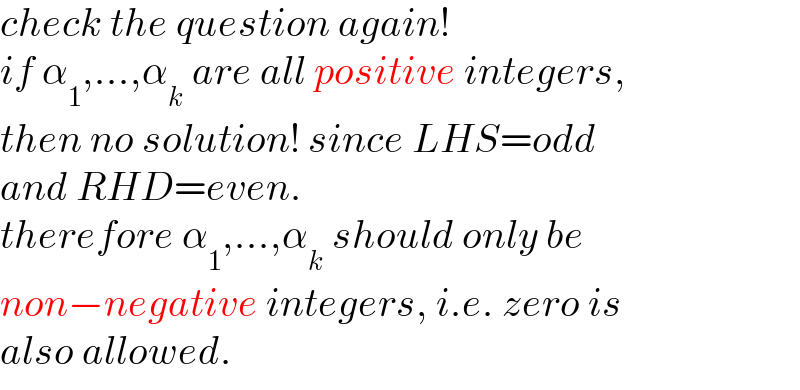Question Number 162552 by amin96 last updated on 30/Dec/21

$$\boldsymbol{\alpha}_{\mathrm{1}} <\boldsymbol{\alpha}_{\mathrm{2}} <\boldsymbol{\alpha}_{\mathrm{3}} <\ldots<\boldsymbol{\alpha}_{{k}} \\ $$$$\frac{\mathrm{2}^{\mathrm{289}} +\mathrm{1}}{\mathrm{2}^{\mathrm{17}} +\mathrm{1}}=\mathrm{2}^{\boldsymbol{\alpha}_{\mathrm{1}} } +\mathrm{2}^{\boldsymbol{\alpha}_{\mathrm{2}} } +\ldots+\mathrm{2}^{\boldsymbol{\alpha}_{{k}} } \:\:\:\:\:\:\:\boldsymbol{\mathrm{k}}=? \\ $$$$ \\ $$$$\boldsymbol{\alpha}_{\mathrm{1}} ,\:\boldsymbol{\alpha}_{\mathrm{2}} ,\boldsymbol{\alpha}_{\mathrm{3}} ….\boldsymbol{\alpha}_{{k}} \\ $$positive increasing integers
Commented by mr W last updated on 30/Dec/21

$${check}\:{the}\:{question}\:{again}! \\ $$$${if}\:\alpha_{\mathrm{1}} ,…,\alpha_{{k}} \:{are}\:{all}\:{positive}\:{integers}, \\ $$$${then}\:{no}\:{solution}!\:{since}\:{LHS}={odd} \\ $$$${and}\:{RHD}={even}. \\ $$$${therefore}\:\alpha_{\mathrm{1}} ,…,\alpha_{{k}} \:{should}\:{only}\:{be} \\ $$$${non}−{negative}\:{integers},\:{i}.{e}.\:{zero}\:{is} \\ $$$${also}\:{allowed}. \\ $$
Answered by mindispower last updated on 30/Dec/21
![289=17^2 X^(17) +1=(X+1)(X^(16) −X^(15) +.............+1) ⇔X=2^(17) (((2^(17) )^(17) +1)/(2^(17) +1))=Σ_(k=0) ^(16) ((−1)^k 2^a_k ) a_k =17k,∀k∈[0,16]](https://www.tinkutara.com/question/Q162566.png)
$$\mathrm{289}=\mathrm{17}^{\mathrm{2}} \\ $$$${X}^{\mathrm{17}} +\mathrm{1}=\left({X}+\mathrm{1}\right)\left({X}^{\mathrm{16}} −{X}^{\mathrm{15}} +………….+\mathrm{1}\right) \\ $$$$\Leftrightarrow{X}=\mathrm{2}^{\mathrm{17}} \\ $$$$\frac{\left(\mathrm{2}^{\mathrm{17}} \right)^{\mathrm{17}} +\mathrm{1}}{\mathrm{2}^{\mathrm{17}} +\mathrm{1}}=\underset{{k}=\mathrm{0}} {\overset{\mathrm{16}} {\sum}}\left(\left(−\mathrm{1}\right)^{{k}} \mathrm{2}^{{a}_{{k}} } \right) \\ $$$${a}_{{k}} =\mathrm{17}{k},\forall{k}\in\left[\mathrm{0},\mathrm{16}\right] \\ $$
